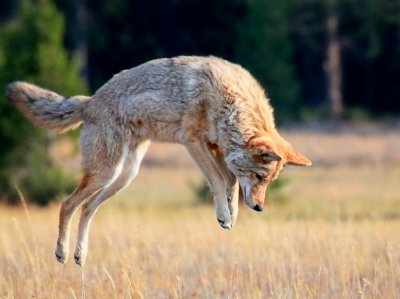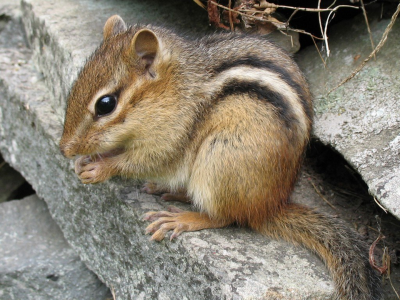
Please Don't Ever Feed the Wildlife!
"Don't feed the wildlife!" means don't feed the wildlife. Common sense, right? Rules are put in place for safety or a situation occurred where a rule needed to be created. With the age of social media, cell phones and selfie sticks upon us it is easy to bend or break these rules in order to get the most "epic selfie" ever or to share with everyone in the social media world that you were ONE FOOT away from a (insert wild animal here)! I am sure we have all been guilty of doing something silly in order to get some "likes" on our social media page.


2. It makes wild animals lose their natural fear of people. Feeding can make large, potentially dangerous animals become too comfortable in residential or recreational areas. Once animals learn they can panhandle for food, they can become a nuisance, or even worse, a safety risk.
3. Feeding wildlife from or near vehicles is dangerous to animals, people, and property. Animals can be hit by moving vehicles or might try to enter vehicles in search of food. In

Coyote Hunting
Recently, it seems our insatiable need for likes, retweets, loves or whatever you want to call it comes at a high price. Unfortunately, it is at the expense of wild and sometimes endangered animals. Working in a park system for eight years, I can now say that I am not the least bit surprised at the lengths people will go in order to get the perfect picture, selfie etc. Although rules in park systems are strictly enforced, reviewed and posted there is no stopping some people. I have witnessed a baby deer in the back seat of a car because a concerned citizen thought it was abandoned (mother was still there) and defaced trees, bridges and monuments. Rules are rules and they are there in order to keep the public AND wildlife and other living things safe and protected. Have you ever wondered why those cute squirrels are so unafraid of you and interested in your food? It is because these wild animals have been fed on a regular basis by park goers and are used to humans. Just think if the squirrels were bigger, less cute animal like an bear. It would then become a "nuisance animal" because they have lost their natural fear of humans. Below are some great reasons not to feed wild animals.

Beware of the bear!
1. “People” food isn’t good for animals. Human foods aren't nutritious enough for animals and may cause serious health problems.
2. It makes wild animals lose their natural fear of people. Feeding can make large, potentially dangerous animals become too comfortable in residential or recreational areas. Once animals learn they can panhandle for food, they can become a nuisance, or even worse, a safety risk.
3. Feeding wildlife from or near vehicles is dangerous to animals, people, and property. Animals can be hit by moving vehicles or might try to enter vehicles in search of food. In
Yosemite National Park in, more than 1,100 vehicles were broken into by black bears, causing millions in damages.
4. Wild animals that depend on people for food can cause injuries or spread disease. When wild animals gather for food handouts, it can cause crowding and competition. These unnatural conditions increase the chances of fighting and injury among animals. It can also increase the spread of diseases, some of which may be transmitted to pets and humans.
What can you do?
1. Rinse all recyclable glass and plastic containers to remove any food remnants and odors. Some animals, like skunks, can get their heads stuck in containers and wind up starving to death. Cut and/or crush plastic containers, and cut each ring of plastic six-pack carriers.
2. Feed your pets inside.
3. Make sure plastic food wrap is rinsed and put in a tied bag or securely covered garbage can.
 4. When visiting parks and similar settings, clean up after yourself and follow the rules regarding wildlife. Encourage others to do the same.
4. When visiting parks and similar settings, clean up after yourself and follow the rules regarding wildlife. Encourage others to do the same.
5. Learn when to step in. If you see an animal who you think may be injured or orphaned, make sure the animal truly needs your help before feeding the animal anything or attempting a "rescue."

7. Provide some natural food sources. Plant some native bushes, trees, or flowers and put up a birdbath or other water feature for your local wildlife. You'll be on your way to creating a humane backyard.
So, please remember when you take your family camping trip this summer, or your out enjoying a hike at a National Park, State Park that we are just guests. These animals that people are trying to ride, "save" or feed are wild and have natural instincts when it comes to hunting, foraging for food and surviving. Trees and plants do not need to have hearts and bad words on them, flowers do not need to be plucked from the soil. Instead, enjoy the beauty of nature and all it has to offer. Take a moment for yourself and put away that phone and selfie stick and live in the moment.
4. Wild animals that depend on people for food can cause injuries or spread disease. When wild animals gather for food handouts, it can cause crowding and competition. These unnatural conditions increase the chances of fighting and injury among animals. It can also increase the spread of diseases, some of which may be transmitted to pets and humans.
What can you do?
1. Rinse all recyclable glass and plastic containers to remove any food remnants and odors. Some animals, like skunks, can get their heads stuck in containers and wind up starving to death. Cut and/or crush plastic containers, and cut each ring of plastic six-pack carriers.
2. Feed your pets inside.
3. Make sure plastic food wrap is rinsed and put in a tied bag or securely covered garbage can.
 4. When visiting parks and similar settings, clean up after yourself and follow the rules regarding wildlife. Encourage others to do the same.
4. When visiting parks and similar settings, clean up after yourself and follow the rules regarding wildlife. Encourage others to do the same.
5. Learn when to step in. If you see an animal who you think may be injured or orphaned, make sure the animal truly needs your help before feeding the animal anything or attempting a "rescue."

A cute little chipmunk.
6. Feed backyard birds and squirrels at home, (approved food if you want). We oppose feeding wildlife when it might cause problems, but feeding birds and squirrels is generally harmless. Don’t feed them by hand. Instead, set up a feeder where you can watch them from a distance.
7. Provide some natural food sources. Plant some native bushes, trees, or flowers and put up a birdbath or other water feature for your local wildlife. You'll be on your way to creating a humane backyard.
So, please remember when you take your family camping trip this summer, or your out enjoying a hike at a National Park, State Park that we are just guests. These animals that people are trying to ride, "save" or feed are wild and have natural instincts when it comes to hunting, foraging for food and surviving. Trees and plants do not need to have hearts and bad words on them, flowers do not need to be plucked from the soil. Instead, enjoy the beauty of nature and all it has to offer. Take a moment for yourself and put away that phone and selfie stick and live in the moment.
